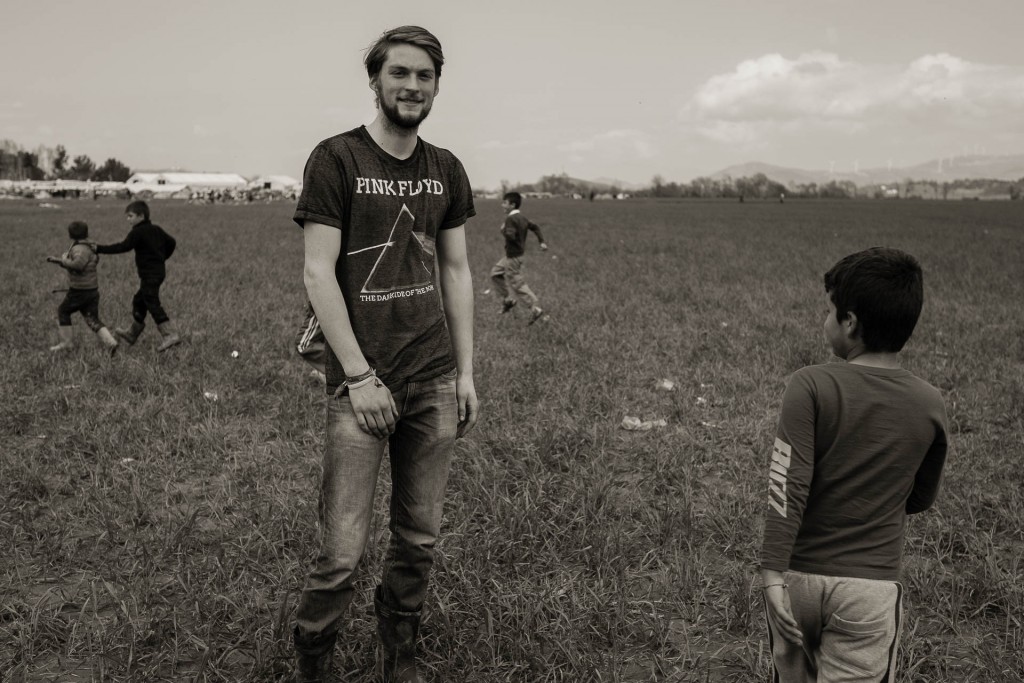So many people had to cross a river without a bridge, sleep outside in wet clothes without tents, and even children were not spared. And all of this happening in the richest continent of the world. Again I wanted to cry, but there was no strength and no tears left.
Jonas Grünzner :: Age 21 :: Biology student :: Germany
Before I came to Idomeni, I never personally experienced disasters or humanitarian crisis, a privilege of growing up in a western first world country. Of course you can see lots of shit in media or the internet, but nothing prepares you for experiencing all of this in real life. When I saw the camp for the first time, I felt the tears creeping into my eyes. I wanted to cry, because people have to live in muddy tents, because they have lost their hopes, and because so many people died and are still dying to end up in the camp of Idomeni.
I am not really sure why I came to Idomeni. Somehow I felt like I wanted to give something back, as an act of balancing, for growing up in a safe and rich country, without having the need to run away from hunger, war or poverty. It felt like the most natural thing to do, spending my summer holidays in Idomeni.
I didn’t know a lot about the Situation there, i listened to a talk by a political group in my hometown about the situation on the greek-macedonian border, which put this idea into my head. After that, I asked them if they had a free seat in their car and, easy as that, they said yes and took me with them. We didn’t know a lot about where to sleep or about the volunteer situation at all, and we also didn’t really know what to expect of the camp and the crisis there. In fact, the day before we went I was fucking scared and wanted to do everything but going. But of course, we were driving anyways, and all negative thoughts scattered as soon we were on the road.
My friends or my family were not really surprised about me going there, I think somehow they knew I had to do this. The positive feedback I got was really overwhelming, I am really glad to have an environment which is so supportive. When I was in idomeni I actually thought about expanding my 2-week-stay to a few months until the crisis would be over, but university called, and I also had some duties at home.
The things I did where mostly preparing soup, handing out soup and playing with children. Giving help to people in need is a great feeling and can be the greatest push for your actions; Thankful eyes and words can really be heart-melting. There is one thing of which I have the most vivid remembrance: The wonderful eyes of the kurdish children I played with on two days. The colour of their eyes is so different from european eyes, they are so deep and seem to say so much, but still they emit the happiness of playing children. Their eyes and their laughter are the best things to take home with me.
A really defining moment of my time in the camp was the day when everybody tried to cross the macedonian border at the river. I was in the water for 6 hours, taking care of children, women, men, old and disabled people, and about two or three thousand of them. I never pushed the envelope that much, I have never been so close to my personal physical and emotional limits. At one point I was able to take a break, in this moment I realized what was happening, and that all of this was happening in Europe. So many people had to cross a river without a bridge, sleep outside in wet clothes without tents, and even children were not spared. And all of this happening in the richest continent of the world. Again I wanted to cry, but there was no strength and no tears left.
What I learned from this experience? You can’t trust governmental structures, they are always talking and talking about how sorry they are, but never they are changing something for the good. Germany just would have to say they give all refugees a chance of asylum, and the border to macedonia would be open immediately. But instead they are ignoring it, ignoring the people who are dying and starving on the borders of europe. This is what Europe is built upon, this is the price of our wealthy, easy life. We all should know this and think about this the next time we talk about a limitation of refugees.


Would you like to share your thoughts?
Your email address will not be published. Required fields are marked *